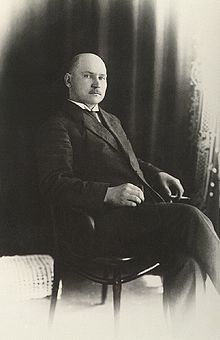Oskar Luts
Oskar Luts (born December 26, 1886 July / January 7, 1887 greg. In Järvepera, today the municipality of Palamuse / Estonia ; † March 23, 1953 in Tartu ) was an Estonian writer.
resume
Oskar Luts attended the village school of Änkküla in 1894 and then from 1895 to 1899 the parish school of Palamuse. From 1899 to 1902 he went to the Realschule ( Reaalkool ) in Tartu. From 1903 he trained as an apprentice pharmacist in Tartu and Narva , from 1908 in Tallinn and Saint Petersburg . From 1911 to 1914, Luts studied pharmacy at the University of Tartu . He took part in the First World War as a pharmacist . In 1919/20 he was an employee of the Tartu University Library and bookseller. From 1922 he finally settled in Tartu as a freelance writer.
Oskar Luts' brother was the Estonian film director Theodor Luts (1896–1980).
Literary work
Oskar Luts was one of the most popular writers in Estonia. His early realistic comedies Paunvere , Kapsapea and Ärimehed (all published in 1913) were already successful.
He achieved his breakthrough with the school novel Kevade (2 volumes, 1912/13), based on his own memories , and the follow-up stories Suvi (2 volumes, 1918/19), Tootsi pulm (1921), Argipäev (1924) and Sügis (1938, 2. Volume 1988). The characters of the novels are the most famous and popular figures in Estonian literature. The film adaptation of his novel Kevade is one of the most successful Estonian screen productions of all time.
Many other works by Luts, who was one of the most productive authors of his time, are also sentimental-naturalistic. Youth studies with a psychological character are Andrese elukäik (1923), Õpilane Valter (1927) and Väino Lehtmetsa noorpõlv (1935). More melodramatic, moral prose are the works Iiling (1924), Olga Nukrus (1926), Udu (1928) and Pankrott (1929). The stories Tagahoovis (1933) and Vaikne nurgake (1934) are characterized by tragicomic and grotesque elements .
Between 1930 and 1941 Luts published his 13-volume memoir. In addition, he was the author of numerous columnist articles, plays ( Ülemiste vanake , 1919), stories for children ( Nukitsamees and Inderlin , both 1920) as well as translations from Russian .
Web links
- Literature by and about Oskar Luts in the catalog of the German National Library
- Oskar Luts Museum in Tartu (Estonian)
- Oskar Luts Parish Museum in Palamuse (Estonian)
- About Oskar Luts (Estonian Institute, English)
| personal data | |
|---|---|
| SURNAME | Luts, Oskar |
| BRIEF DESCRIPTION | Estonian writer |
| DATE OF BIRTH | January 7, 1887 |
| PLACE OF BIRTH | Järvepera, today the municipality of Palamuse |
| DATE OF DEATH | March 23, 1953 |
| Place of death | Tartu |
